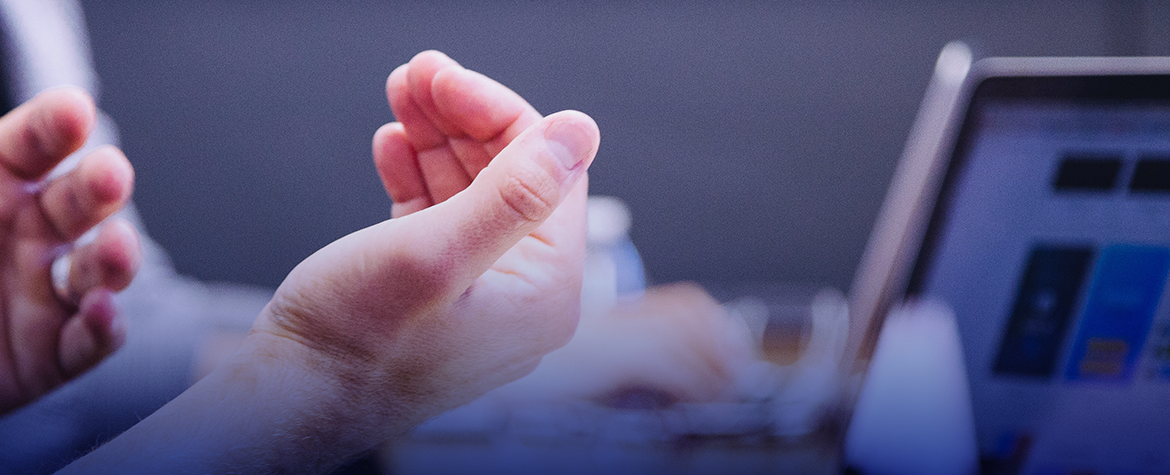With the pandemic nearing some sort of ebb, we’re going to be seeing a return to live events. We’ll probably witness more concerts, conferences, exhibitions, and parties in the coming months. However, if your event SEO, promotion, and planning skills are a bit rusty, don’t fret. We’ve got you covered with some crucial techniques, tips, and insights for getting back into the motions.
Our main interest for this article is online promotion. There are other physical promotional avenues as well, but we’d be here all day if we started covering everything. That’s why this article focuses primarily on event SEO techniques, social media, and websites as promotional tools.
Additionally, we’re assuming you’ve already planned a physical or virtual event, so we’re going to dive into the online marketing aspects. If you’re looking for a primer on running an event, this isn’t it. We’re assuming you have a venue or site all worked out. What you need is to make sure the right people attend and remain interested.
First, let’s go over the basics…
How to Promote an Event Online
Online promotion starts and ends with your ability to find your audience and their ability to find you. SEO (among other tools) helps with the latter, while effective advertising like PPC campaigns enables you in targeting them. Both sectors of this strategy are necessary in reaching out to the widest possible segment of potential consumers.
Make sure:
- You have the relevant web and social media presence. Emphasis on relevant: know which platforms are most suitable to your audience. Take into account their age group, demographic characteristics, their interests etc.
- You also have appropriate tools for the type of event promotion. Live streaming requires equipment and stable connections, for example.
- Methods of registration and keeping track of attendees. This can be easily done through social media platforms’ own event planning options.
- Constant communication both as a reminder to attend the event and a means of keeping people updated.
- Surveys and data collection. Make sure you use the opportunity to poll people and derive the best experience for next time.
Boosting Event SEO
SEMrush is fantastic for mapping out how best to gather keywords and create content to promote your events. Have content that people will link to and share. We’ve covered how to use SEMrush effectively in previous articles, so do look those up if you need a refresher. Whatever software you’re using to run your analytics, there are a few things to keep in mind.
Once you’ve created a keyword list, remember to refresh it up till the day of the event. You may find differences in how effective keywords are over time, so it can be useful to use the refresh option. This is especially relevant if you’re planning things months in advance. This will keep you on your toes and also constantly update you about shifting audience interests.
Additionally, if your event is local, adjust the settings to your region. Your online marketing strategies need to be kept local in these situations (more on that below). Adjust your keywords in terms of local search primarily.
That said, if you also want to get more international buzz, it doesn’t hurt to have an event trending elsewhere. You may want this if you need to take your operations to other regions as part of your post-event marketing. It depends on your end goals.
Event Hashtag Planning
The most basic advice we can give is that you need to know your hashtags and how to get effective ones. There are hashtag generators that can aid in this process. The image below shows off how such generators can work:
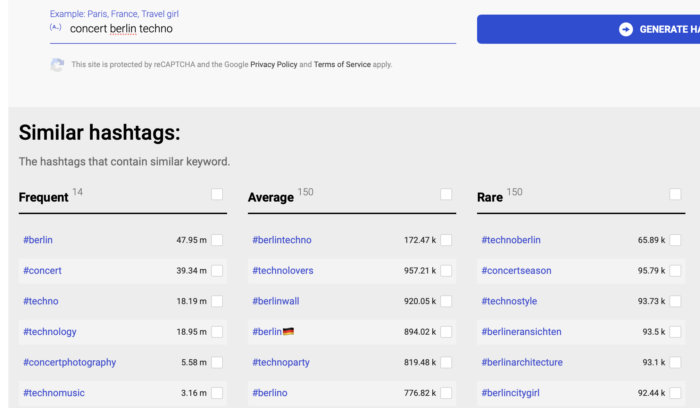
As you can see, the hashtag generator took my very basic premise for an event and produced a useful output. These hashtags are rated in terms of popularity and fit the main keywords. Use a few of these as they might fit (though too many can get obnoxious). Try to double-check them with SEMrush by running a keyword analysis to see how well they rank.
Check your metrics. It’s important to have many social media platforms at the ready, but equally important to focus your efforts. Know your audience: Identify whether they are Instagram people or Twitter people etc.
This doesn’t just affect how to place hashtags but there are other considerations. It also means this is the platform where you need to be engaging the most. This includes answering questions, receiving queries, branding, and driving your engagement.
The platform also determines what type of content you’ll be placing hashtags over. Instagram is more visual, Twitter is text-based, and Facebook can vary heavily. Remember: suit your message to the medium you’re operating in.
The final tip I’d like to stress is that you need to RESEARCH YOUR HASHTAG properly. Learn from past mistakes, like when DiGiorna pizzas tried to jump onto a hashtag trend and it severely backfired. The company became a laughingstock on social media for quite some time. Research can spare you severe damage to your brand.
What Makes Event SEO & Online Promotion Different?
Event promotion can vary in ways that most B2C or B2B promotion doesn’t. Events can often be one-off. Even if they aren’t, the nature of the event or the occasion or the venue can change from project to project.
This means that you need to update SEO and your marketing plans constantly. This can depend on changes in the purpose of the event, varying projects, venues, etc. The changing nature of events plus the constant need to start over for any subsequent event can be a headache.
Similarly, the purchase funnel for an event often requires constant reinforcement. This is especially the case as events are very time-dependent. This means you have a small window to recoup the money in comparison with a physical product like a game console. This also means that the event needs to break even in a far shorter timespan.
In summary: Events come in small units, are time-dependent, and are abstract experiences rather than physical goods.
In light of these factors, here are some tips for creating a more consistent income and maintaining recurring audience interest…
Tips For Event Promotion & SEO
Implement Local SEO Solutions For Venues
If you’re running a venue or promoting it, local SEO can be very beneficial. A few ways to do this:
Localise your event SEO by utilising Google My Business and attach a link to Google maps locations and directions. Fill out the tags for your business in both Google my business and on maps, along with contact details. This will help people find your business and enhance the effectiveness of any local marketing campaign.
As mentioned previously, it’s best to make use of high-performance keywords in your local area. Use these to improve your website’s on-page SEO.
In terms of SEO and event promotion, the venue can be a major draw. Concerts at a major venue, for example, already have an advantage as the website draws a lot of traffic and attracts attention by brand name alone. Utilise the name of the venue in your marketing to attract people familiar with it.
Get visitors and clients to write good reviews for your venue. This applies to both on the website and off the website (like on Google Maps or on other business listings).
Local SEO services and consultants can also help optimise your web pages for detection but this is usually a temporary fix. SEO keeps changing as more information is added to Google or as they make changes to the algorithm. Local SEO, however, is especially helpful as Google prioritises location-based searches. It’s a lot more stable than a lot of other forms of SEO.
Another tip is to have different pages for all the different services or types of events your venue offers. This can help reach more narrow event types that promoters or potential customers may be looking for. People often search for venues by the purpose of the event they’re planning or looking for. Concerts, conferences, parties, etc.: target all of them separately and you’ll cover more ground online in terms of searches.
Local Event SEO & Promotion for Organisers
Employing good structure for your pages and implementing schemas can go a long way as promotional tools. They can really make you stand out on a search engine. Let me give you an example from when I searched for concerts in New York:
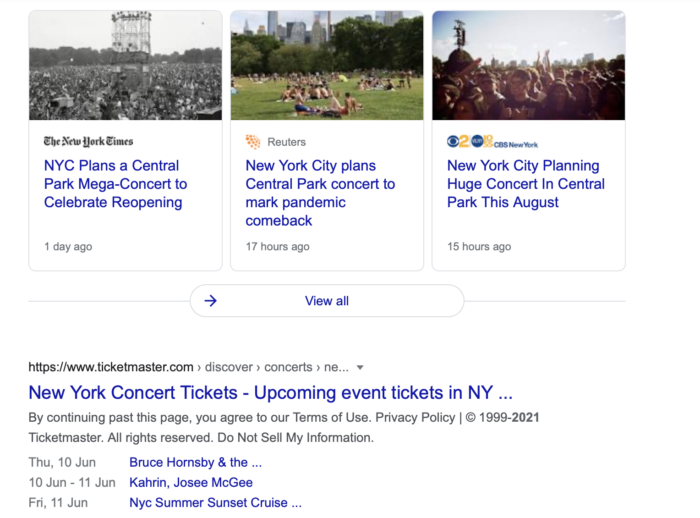
On the top, you have news stories about events with the same keywords and below that links to Ticketmaster. By structuring your content properly (using schemas, lists, appropriate tags and metadata etc.), you can easily draw the eye of a potential customer. You can also put your event on sites like Ticketmaster, as shown above. This can help you get more visibility.
Of course, not everyone has the scope and scale of operations that get them newspaper headlines or a competitive spot on Ticketmaster. In these cases, try your best to wind up on the local events pack Google puts up:

This is a good way of attracting local audiences searching for something in their area. It does have the downside of looking a little bland and crowded compared to the previous one but it’s useful nonetheless. It requires careful event SEO planning but it pays off well in terms of exposure and conversions.
To do this make sure your pages aren’t blocking Google bots. Also, imbed structured data and adjust your URLs so they don’t confuse search engines (among other adjustments).
It’s common knowledge that showing up higher on the search engine results page is crucial. This pack helps achieve that fairly easily compared to other SEO measures. Google has an in-depth article about how to achieve this right here. We’d recommend reading it for the best advice on event SEO promotion, straight from the horse’s mouth.
Attracting Audiences: New & Returning
If your company organises a variety of events, a good way of attracting customers is to keep a mailing list. This should include people who have attended previous events. Cross-reference this with future events and the demands of the organisers in terms of demographics. Age, gender, interests, and other such characteristics can help you reach out to them for future events.
Once you have such a list, start up an email marketing program for upcoming events that might interest them. If they click on an event but don’t purchase a ticket, send automated reminder emails. Retarget customers if a similar event to one they visited is in the pipeline.
Posting images of events on social media or emailing them to attendees. This fosters more customer interaction with your venue or older projects. It can help them in sharing content on their timelines or Instagram stories. If you can get them to tag themselves or rate your venue, it would be great for local SEO campaigns.
Another means of bringing back customers and attracting new ones is employing various pricing strategies. This could include:
- Discounts for returning customers.
- Bundle packages that promise multiple events to new customers. These can increase the chance they will return in the future.
- Early-bird discounts for people who sign up for the event first.
Mix Digital & Physical Promotion
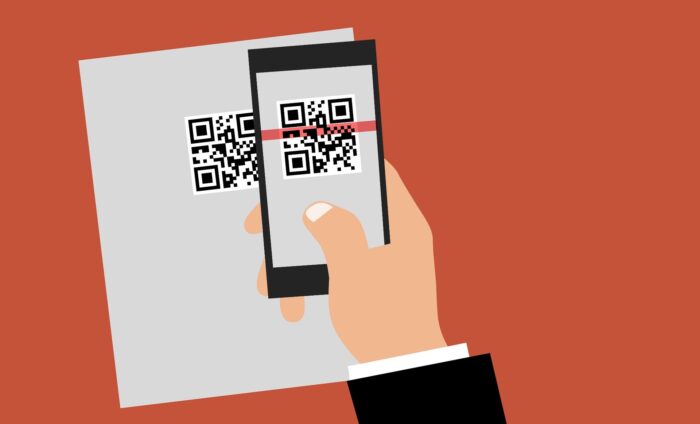
While digital is cheaper in most regards, it can be important to have a significant physical presence in many cases. This includes posters, flyers, brochures, etc.
You can also integrate both digital and physical promotion. Obviously, one has to remember to link the website and socials in the physical text. However, there are ways to take this a step further.
QR codes that help with the sign-up or registration for an event can expedite the process heavily. The ability to access the website instantly can severely help a user through the purchase funnel. Remember: there are many consumers who will simply forget (or be too lazy) to sign up. Use digital processes to make the experience as smooth as possible.
Speaking of digital …
Virtual & Digital Events
Virtual events might seem like a step down from live interaction, but they can be done well. The best way to do them is to enhance interactivity and take advantage of the online format. Even if your interest is only in physical brick-and-mortar events, this section could be worth reading. If the pandemic taught us anything, it’s that you always need to have a backup plan.
A recent event that I found very engaging in its format was the GROW event by HubSpot. The web design gave the event a unique feeling, like clicking through a SimCity map. The different buildings represented different companies’ presentations. It was essentially a simulacrum of the experience of walking through a convention centre with multiple stalls on each side.
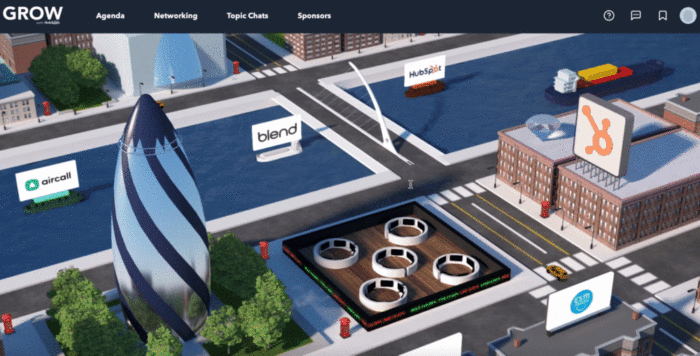
Such events can be more engaging than a simple conference. There were people at every company’s “booth” ready to have a conversation with you via video chat. This was also effective in that it focused the overall experience allowing for individual interaction.
Live streaming events (or at least recording them) is going to become a necessity soon. If you can give people a taste of what they’re missing out on, it will encourage them to attend. If you have the start-up capital for it, try new formats like the Facebook event live stream feature for VR.
Similarly, create an AR integration for things like museum exhibits or art galleries. It can be a good promotional tool to make you stand out from the crowd. Make sure it’s appropriate to the event.
How to Promote Your Event on Social Media
Another way to boost local online marketing for events is to have content set up. When people want to know about an event, they may want to see pictures or videos of sister events. Have this at the ready.
In terms of attracting attention, the more visual the experience the better. If a band is playing, show why they’re a good act. If it’s an art gallery exhibition, inform people of the background or historical importance in an accessible YouTube video.
Promoting on social media has its benefits. The events manager on Facebook (for example) can make it very easy for people to sign up and receives notifications. Additionally, it’s quite convenient having the advertising and the event page on the same platform, a single click away. There’s practically an in-built audience for these platforms.
Similarly, virtual events would work best on the platform you’re promoting it on. Getting people to click off of a website and onto another one is more difficult. The level of difficulty continues to rise the more hurdles you add (email verification, registration, credit card info etc.). Doing something overly elaborate on your own platform will require more coercion and more incentives for the consumer.
The best event social media campaigns make use of the multimedia format that platforms like Facebook allow. Have videos, testimonials, posts, pictures, and other types of advertising ready. There is a wealth of digital marketing tools present within each platform.
Short Tips For Social Media Event Promotion
- Use ephemeral content: Ephemeral content like Instagram stories can be useful as it takes priority on many social media sites. Additionally, formats like countdowns to an event can be useful in building anticipation.
- Post teasers: Teasers on social media can go a long way. Videos are more visual than text and give a more tangible example of the event and what it will be like.
- Host giveaways: We talked briefly about things like early bird price schemes. These can also be a major source of attracting people. Prizes are good. Ticket giveaways to one person might also have the effect of convincing them to bring friends along.
- Keep promotion going during the event: Don’t stop. Interview attendees during the event, take pictures and keep the updates coming. Not only is this good for promoting the event, but it also boosts your presence on social media. It will make people pay attention to future events.
- Post live user-generated and social media content: Some companies have been experimenting with large panel screens that display user tweets. It can be a good idea, but please moderate it manually. These types of user-generated promotions are rife with vandalism, as companies have learnt in the past.


